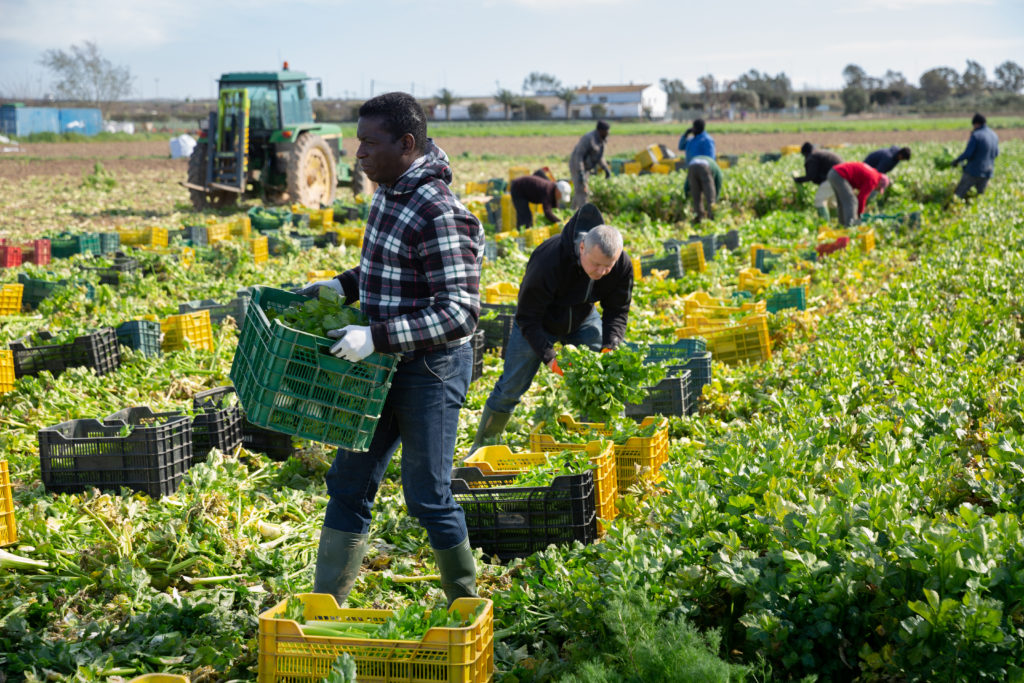Everyone deserves the same basic protections and rights on the job. Laws guaranteeing the minimum wage, overtime, and the right to form a union are foundational to creating the types of good jobs Mainers need to thrive.
But workers in Maine’s agricultural and food processing industries — which employ a disproportionately large share of Black, Latino, Indigenous, and Asian American Mainers — have been denied those basic rights. Exemptions with discriminatory roots leave workers in these fields at higher risk for poverty and make racial inequities worse.
Lawmakers this year can right those wrongs by ensuring the essential workers who make the food that stocks our grocery store shelves and kitchen cupboards have the same right to a minimum wage, overtime, and the ability to form a union as any other worker.
Two bills to guarantee workers’ rights
During the past year, the COVID-19 pandemic tested us and the economy in unprecedented ways and drove home many of the problems in our economic status quo. Among these was our society treats many of our most important workers.
Agricultural workers and food processing workers were among the groups of workers deemed “essential” by state and federal authorities at the outset of the pandemic. Many of us experienced first-hand the upheaval caused by even the relatively short disruptions to the food supply chain in March and April last year. Yet these critically essential workers are also among the worst paid in our state and not extended the same basic economic guarantees as other workers.
LD 151, sponsored by Rep. Thom Harnett, would amend Maine’s labor laws to restore agricultural workers’ right to form a union and bargain collectively for wages, benefits, and workplace conditions. In doing so, it would restore a historic right that was taken away by a previous Legislature, in 2012.
LD 1022, also sponsored by Rep. Harnett, would correct a historic inequity in our economy by requiring employers to pay at least the minimum wage and provide overtime for farm workers and some currently excluded food processing workers, who have been exempt from these basic wage and hour protections for too long.
A legacy of racial discrimination
Maine’s agricultural workers are not covered by state minimum wage and overtime laws at all, and only some workers qualify for the federal minimum wage. This is a relic of racially discriminatory policies enacted in the early 20th century that were designed to provide a wage floor for industries dominated by white workers while preserving the right of employers in fields dominated by workers of color to pay substandard, poverty wages. i
This legacy of discrimination is hurting farmworkers today: Maine’s farmworkers are so poorly paid that they are much more likely to live in poverty than other Mainers: One quarter of Maine Farmhands live in poverty, making them roughly 4.5 times as likely to live below the poverty line as other Maine workers.ii
None of this is to say that agricultural employers today are actively engaged in racist practices. But the rules governing the agricultural sector — which still employs more Latino, American Indian, and Black immigrant Mainers than other industriesiii — perpetuates economic disparities along racial lines. Policies to expand the same protections to farm workers will help reverse racial inequities in our state.
Similarly, Maine’s food processing workers are exempt from overtime protections. This carveout in Maine’s labor law is outdated and harmful, with disproportionate impact on Mainers of color. Black, Latino, and Asian American Mainers are overrepresented in this work, which is often poorly paid and dangerous. The Coronavirus pandemic has been especially hard on workers in this sector, with particularly high numbers of cases and deaths.iv The least these workers deserve is the right not to be asked to work long hours without overtime pay.
Shining a light on violations
Minimum wage, overtime, and the ability to form or join a union are rights most of us take for granted. Without them, farmworkers are vulnerable to exploitation less likely to receive fair compensation for their labor.
Data shows that violations of labor law are common in the limited areas where federal labor protections do apply, such as laws governing the treatment of migrant workers and the payment of the federal minimum wage. Nationally, 70 percent of US Department of Labor investigations at farms reveal violations of labor law.v It seems even more likely that employees are being mistreated in areas where there are no legal consequences at all, such as those addressed by this bill.
A movement to right the wrongs of the past
Maine would not be the first state to address this historic mistake. Five states (California, New York, Ohio, South Dakota, and Wisconsin) include farmworkers in their minimum wage laws. California, the state which employs the largest number of farmworkers, recently included these workers in its overtime protections as well. Nine states (Arizona, California, Hawaii, Kansas, Massachusetts, New Jersey, New York, Oregon, and Wisconsin) have some form of collective bargaining rights for agricultural workers. As, indeed, did Maine until 2012.
Farm laborers and food processors in Maine have been excluded from basic worker protections for too long and for reasons rooted in prejudice. It’s time for Maine to join other states working to reverse injustice and recognize that all workers deserve these basic protections.




